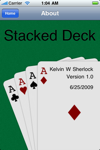 Between work and personal tasks (like maintaining Grey Matters!), I don't always get to practice my memorized stack order as much as I'd like to. One of the first things I did when I purchased my iPod Touch was to purchase Mental Case (iTunes Link). So, when I came across the Stacked Deck native app (iTunes Link) version 1.0, I figured this was worth checking out.
Between work and personal tasks (like maintaining Grey Matters!), I don't always get to practice my memorized stack order as much as I'd like to. One of the first things I did when I purchased my iPod Touch was to purchase Mental Case (iTunes Link). So, when I came across the Stacked Deck native app (iTunes Link) version 1.0, I figured this was worth checking out.
One of the first things you notice about this app is the price ($4.99 at this writing), which is expensive compared to most apps. This is understandable when you consider that it is intended for magicians practicing a memorized deck, and is expensive enough to prevent the merely curious from downloading it.
To get a better idea of the program, you can see the screenshots both at the iTunes Link, and on Stacked Deck's AppShopper description page.
When you open it, the first thing you want to do is put in the stack order in which you're going to be quizzed. If you enter any of the following names as the stack name, the program offers to automatically populate the stack with the proper order for you:
• Arsonson
• Eight Kings/8 Kings
• Ireland
• Joyal (but not "6 Hour Memorized Deck")
• Nikola
• Osterlind
• Stanyon
• Stebbins/Si Stebbins (Starting with the 6 of hearts)
• Tamariz (but not "Mnemonica")
What to do if you're working with another stack that's not on this list? The way the program is set up, it seems like it should allow you to set your own stack by first entering your own name, and then clicking on a position to enter a card. A screen even comes up with a great interface to allow you to easily enter a card by just touching the value and the suit. However, when you hit the Save button . . . you're returned to the deck screen without the card being saved. Whether you're entering an individual card or an entire deck order (which the interface allows you to do by sliding your finger back and forth to change positions), all clicking Save does is cause the program to forget your input.
This aspect is very disappointing, as the basic workings seems to be there, but with no actual functioning. Considering this is one of the more expensive apps in the app store, you would think a little extra time could be spent to make sure the program fully functions before release. Without a doubt, this should be the first fix in any upgrade of this program.
As it happens, I use the Tamariz stack, and as noted above, you can have the program automatically set it up, so I am able to comment on the rest of this program.
One of the more unusual features is the slideshow section, where you can have the order of the deck played forward or backward. This can be of great help, especially in the earlier stages where you're just getting familiar with the order. As the slideshow is playing, you can adjust the speed, and even pause it. Playing forward and backward are currently 2 different selections in the main menu, but it would be interesting if you could change the slideshow direction during the slideshow itself.
The quizzes, though, are the real heart of the program. As I mention in my memorized deck online toolbox, Dennis Loomis's Memorized Deck Mastery article details exactly what you should know about your particular stack before you can consider it truly mastered.
By these standards, the Stacked Deck app doesn't skimp on the quizzes. You can quiz yourself on the card on the number (and vice versa), as well as the next card and previous cards in both a random fashion, and even in sequence. If you're stumped, you can click the Help button to see the answer. No card in the quizzes will ever repeat until you've seen all 52.
The quizzes don't end until you select the home button. Once you do, you get a handy report, including the total time and number of cards, how many mistakes you made, how many times you asked for help, as well as an average time per card. One thing that could of great help here is some sort of history feature or at least a top score board, where you can go back and see your progress.
Since this is ultimately a flashcard program geared specifically towards playing cards, it would be nice to see it employ both the Leitner System (more frequent questioning of missed cards) and a spaced repetition algorithm. It is largely the lack of this feature which will prevent from relying solely on the Stacked Deck app for card memory. Mental Case may not be geared towards cards, but the more frequent questioning and spaced repetition do help.
Due to mostly to the glaring inability to add a custom stack when it seems to be offered by the program, I'm afraid I can't recommend this program just yet. However, it does have so many good qualities, it is definitely worth keeping an eye on for updated versions.
0
Review: Stacked Deck (Native App)
Published on Sunday, August 02, 2009 in downloads, memory, playing cards, reviews, software
Related Posts
Post Details
Subscribe to:
Post Comments (Atom)




No Response to "Review: Stacked Deck (Native App)"
Post a Comment